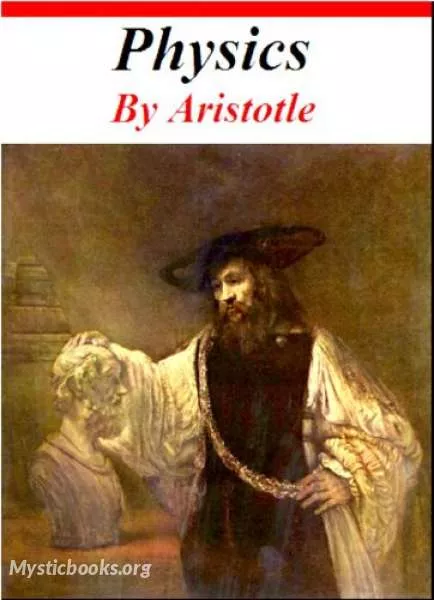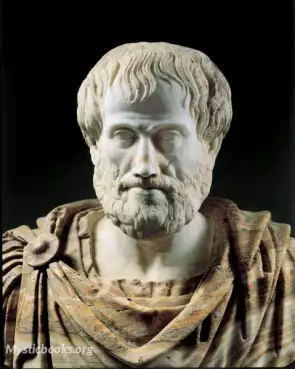
Physics
by Aristotle
'Physics' Summary
The Physics is composed of eight books, which are further divided into chapters. This system is of ancient origin, now obscure. In modern languages, books are referenced with Roman numerals, standing for ancient Greek capital letters (the Greeks represented numbers with letters, e.g. A for 1). Chapters are identified by Arabic numerals, but the use of the English word "chapter" is strictly conventional. Ancient "chapters" (capita) are generally very short, often less than a page. Additionally, the Bekker numbers give the page and column (a or b) used in the Prussian Academy of Sciences' edition of Aristotle's works, instigated and managed by Bekker himself. These are evident in the 1831 2-volume edition. Bekker's line numbers may be given. These are often given, but unless the edition is the Academy's, they do match any line counts.
Book I (Α; 184a–192b)
Book I introduces Aristotle's approach to nature, which is to be based on principles, causes, and elements. Before offering his particular views, he engages previous theories, such as those offered by Melissus and Parmenides. Aristotle's own view comes out in Ch. 7 where he identifies three principles: substances, opposites, and privation.
Chapters 3 and 4 are among the most difficult in all of Aristotle's works and involve subtle refutations of the thought of Parmenides, Melissus and Anaxagoras.
In chapter 5, he continues his review of his predecessors, particularly how many first principles there are. Chapter 6 narrows down the number of principles to two or three. He presents his own account of the subject in chapter 7, where he first introduces the word matter (Greek: hyle) to designate fundamental essence (ousia). He defines matter in chapter 9: "For my definition of matter is just this—the primary substratum of each thing, from which it comes to be without qualification, and which persists in the result."
Matter in Aristotle's thought is, however, defined in terms of sensible reality; for example, a horse eats grass: the horse changes the grass into itself; the grass as such does not persist in the horse, but some aspect of it – its matter – does. Matter is not specifically described, but consists of whatever is apart from quality or quantity and that of which something may be predicated. Matter in this understanding does not exist independently (i.e. as a substance), but exists interdependently (i.e. as a "principle") with form and only insofar as it underlies change. Matter and form are analogical terms.
Book Details
Language
EnglishOriginal Language
Ancient GreekPublished In
Authors

Aristotle
Greece
Aristotle (384–322 BC) was a Greek philosopher and polymath during the Classical period in Ancient Greece. Taught by Plato, he was the founder of the Lyceum, the Peripatetic school of philosophy...
Books by AristotleDownload eBooks
Listen/Download Audiobook
- Select Speed
Related books

Intelligenz der Blumen by Maurice Maeterlinck
In "Intelligenz der Blumen", Maurice Maeterlinck präsentiert eine Sammlung von elf Essays, die tiefgründige Betrachtungen über die Natur und die Gesel...

Insects by John Clare
John Clare's "Insects" is a collection of poems that reflect the poet's deep connection to the natural world, particularly the insects he observed in...

Birds and All Nature, Vol. V, No 5, May 1899 by Various
'Birds and All Nature' was a monthly magazine published in the late 19th and early 20th centuries, showcasing the beauty and wonder of the natural wor...

Our Western Birds by Elizabeth Grinnell
This mother and son team, each distinguished in their field, collaborate to give charming portraits of common birds of the western United States from...

Understanding Climatic Change by US Comm. for the Global Atmospheric Research Program
A Program for Action is a 1975 report by the US Committee for the Global Atmospheric Research Program. Already at this time, it was understood that a...

The Freedom of Life by Annie Payson Call
"The Freedom of Life" is a book written by Annie Payson Call, an American author and teacher of the Alexander Technique, a method for improving postur...

Gardening Without Irrigation by Steve Solomon
A delightfully brief introduction to the practice of dry gardening. Even in wet years, these techniques should prove useful in conserving water and ma...

American Scenery, Vol. 2 by Nathaniel Parker Willis
American Scenery, Volume 2, presents a collection of engravings depicting scenic locations in the Eastern United States, primarily New England and New...

Spell of the Yukon by Robert W. Service
The Spell of the Yukon is a collection of poems by Robert W. Service that capture the spirit of the Klondike Gold Rush. The poems are full of vivid im...

Longings for Home by Walt Whitman
“Longings for Home” is a collection of essays by Walt Whitman, exploring themes of home, longing, and nostalgia. It delves into the complexities of hu...
Reviews for Physics
No reviews posted or approved, yet...